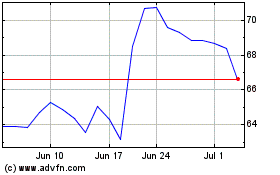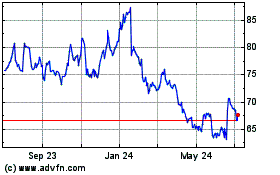Biotech Investing Lessons: GILD Buys VRUS - Tactical Trading
November 20 2011 - 7:00PM
Zacks
Gilead Sciences (GILD) and
Pharmasset (VRUS)
announced today that the companies have signed a definitive
agreement under which Gilead will acquire Pharmasset for $137 per
share in cash.
The deal, which values Pharmasset at approximately
$11 billion, vaulted shares of the unprofitable maker of hepatitis
C drugs over $60 from Friday's close near $73 to a high thus far
today of $135 .
Pharmasset currently has three clinical-stage
product candidates for the treatment of chronic hepatitis C virus
(HCV) advancing in trials in various populations. Gilead's research
and development portfolio includes seven unique molecules in
various stages of clinical development for the treatment of
HCV.
"The acquisition of Pharmasset represents an
important and exciting opportunity to accelerate Gilead's effort to
change the treatment paradigm for HCV-infected patients by
developing all-oral regimens for the treatment of the disease
regardless of viral genotype," said John C. Martin, PhD, Chairman
and Chief Executive Officer of Gilead.
Biotech Profit Rockets: How Do You Know?
If you had looked strictly at Pharmasset's earnings
outlook, you may not have seen the opportunity here. With last
year's loss around $1.25 and this year and next projected to be
minus $1.56 and minus $1.80 respectively, the earnings momentum
trend did not appear to be reversing its downward trajectory
anytime soon.
But, this is the nature of biotech R&D. We
never know who will make it through the years of cash-drain and the
FDA gauntlet with the next successful drug.
Or, who will buy the next struggling drug maker
with as yet unproven science. The past three years have seen record
amounts of M&A, with $51.6 billion in the first half of 2011
already closing in fast on 2010's $67 billion. Today's deal and a
couple of others now put this year ahead of last.
The lesson for investors is multi-fold:
1) At the minimum, maintain conservative exposure
to the industry -- and thus to the future of medicine -- through a
basket like the Nasdaq Biotechnology ETF (IBB). I have owned
and traded the IBB since 2009 when I first bought it for $65.
Earlier this year, it reached as high as $110 and now trades back
in the mid-$90s.
2) Study the companies and their science. While
it's true that trying to sift through the drug R&D reports
without a life sciences education could be considered futile, you
never know what you'll learn that could inspire you to find out
more and even cause you to specialize in an area, like specific
cancer treatments or hepatitis drugs for instance.
So understand that you risk your time as well as
your money in biotech investing, and that even though a good degree
of luck may be involved in finding winners, you can't go wrong if
you enjoy the pursuit.
3) Try to put the odds in your favor with a
combination of edges, both technical and fundamental. For
Pharmasset, your fundamental analysis was based purely on the
company's science and the chatter about it being a potential
acquisition target. But the chart here was always in good shape,
indicating that the stock was under steady accumulation.
4) Be willing to accept a low success rate. If you
invest in biotech companies, you are likely to have a lot more
InterMune (ITMN) and Dendreon (DNDN) stories than
Pharmasset ones.
Know this going in and also know how bad the
blow-ups can be when an FDA trial is flunked and destroys the
hopeful's dreams. Often, even a stop loss can't protect you from a
75% destruction in a biotech's stock price overnight.
Biotech Lottery Tickets: Discovering Science and
Decent Odds
Here's an example of a small-cap biotech that I
learned about and have traded a few times in the past three years,
always waiting for it to be discovered and always being mildly
disappointed, but never losing money.
Raptor Pharmaceutical (RPTP) is a $5 stock
with a $235 million market-cap. The firm is engaged in preclinical
programs for the development of bioengineered novel drug candidates
and drug-targeting platforms derived from the human
receptor-associated protein (RAP) and related proteins that are
designed to target cancer, neurodegenerative disorders and
infectious diseases.
The way I understand the science of their R&D
goals is that RAP-based drugs and platforms will enhance how other
drugs enter and leave cells through the bloodstream. This sounded
like revolutionary science to me at the time three years ago when I
first plunked down $1,500 for 500 shares.
On the earnings front, Raptor lost 85 cents per
share last year and is projected to go from a loss of $1.15 this
year, to a loss of only 45 cents next year. With eight analysts
covering the company, I am seeing some stability in the estimates,
with the high/low range for next year being minus $0.24 cents EPS
to -$0.79.
I am not recommending Raptor today, although I do
like the chart right here, especially with the recent string of up
days on good volume, including today. I just wanted to use it as an
example of how to play the biotech investing game with more reward
than risk. Even if I had lost money on my trades, I would still
feel like I gained something valuable from the simultaneous pursuit
of knowledge and wealth.
Disclosure: I own RPTP
Kevin Cook is a Senior Stock Strategist with
Zacks.com
DENDREON CORP (DNDN): Free Stock Analysis Report
GILEAD SCIENCES (GILD): Free Stock Analysis Report
INTERMUNE INC (ITMN): Free Stock Analysis Report
RAPTOR PHARMACT (RPTP): Free Stock Analysis Report
PHARMASSET INC (VRUS): Free Stock Analysis Report
Zacks Investment Research
Gilead Sciences (NASDAQ:GILD)
Historical Stock Chart
From May 2024 to Jun 2024

Gilead Sciences (NASDAQ:GILD)
Historical Stock Chart
From Jun 2023 to Jun 2024
